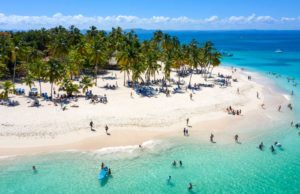Wildlife & Nature
Best Bird Watching Sites in Dominican Republic
Birdwatching in La Vega
Photo: Javier Gautier
Our Best Selections for Your Dominican Birdwatching Checklist
Share
Whether you're an amateur birder or an experimented ornithologist, the Dominican Republic has a world of over 321 thriving species of tropical birds, 31 of which are endemic across the country's geographical landscape.
Exuberant mountain ranges, desert plains, river valleys, mangrove and pine forests, subtropical national reserves, and coconut palm coastal lines serve as prime habitats for our feathered fauna.
We'll go through the eight best locations, taking into account each bird's biodiversity, ecological significance, and rarity in their respective habitat.
So, pop the lens cap off your camera for some prime birdwatching in the Dominican Republic and get ready to snap away!
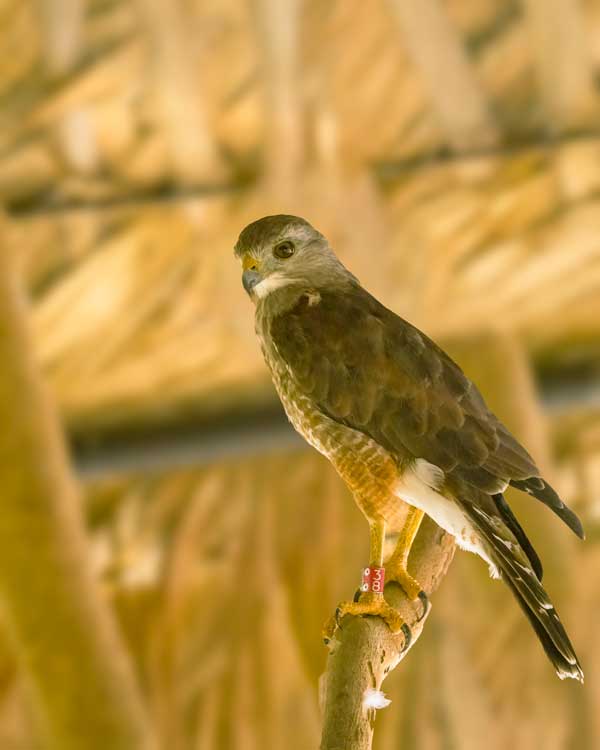
Guaraguao (Ridgway’s Hawk)
Photo: Fausto Suero
Constanza
Constanza is mountain country at the center of the Cordillera Central (central mountain range) in the heartland of the Dominican Republic.
Here you'll explore the Valle Nuevo National Park at Madre de las Aguas (the mother of waters), where the north and south Yaque, Bao, Nizao, and Camú River, among others form.
There alone, you'll find 66 bird species living in the clouded Hispaniolan Pine forests like the Guaraguao (Ridgway's Hawk), Ciguita de Constanza (Rufous-collared sparrow), the colorful Jilguerillo (Antillean Euphonia), and the camouflaged Cotorra Dominicana (Hispaniolan amazon).
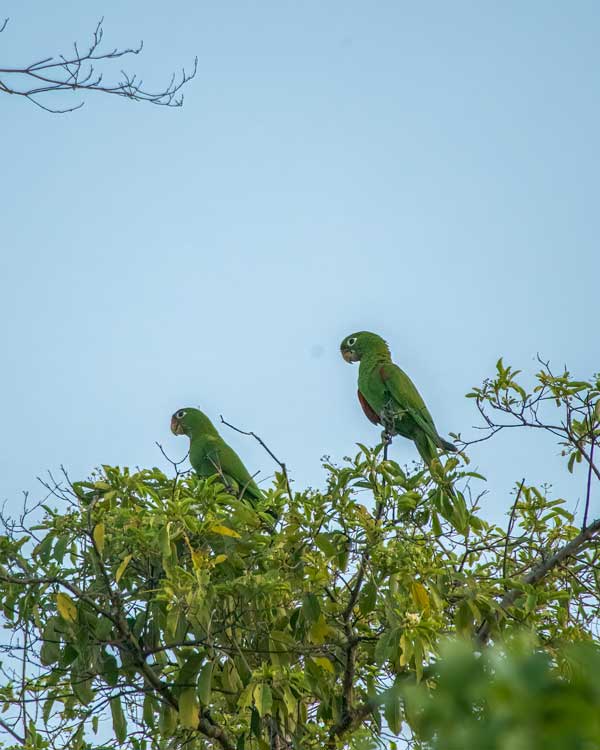
Hispaniolan parakeet
Photo: Fausto Suero
Sierra de Bahoruco
The Sierra de Bahoruco National Park is a haven for 30 out of 31 endemic birds in the nation - reaching into the Pedernales, Barahona, and Independencia provinces with 1,226 square kilometers of broadleaf and mountainous humid cloud forests.
Of those most notable amidst the foliage are the Ciguita Aliblanca (white-winged warbler), Chirrí (eastern chat-tanager), El Perico (Hispaniolan parakeet), and the Jilguero (Antillean siskin).
For the experienced birdwatcher wanting to go the extra mile, this national park forms part of the much larger and extensive protected area of the La Selle-Jaragua-Bahoruco-Enriquillo Transboundary Biosphere Reserve, which stretches across the Haitian-Dominican border.
One of only 21 Transboundary Biospheres in the world - you’ll gain access to La Selle National Park in Haiti.
Discover the 10 Amazing Birds of Haiti and the Best Birdwatching Sites of Haiti, to take your adventure on another level!
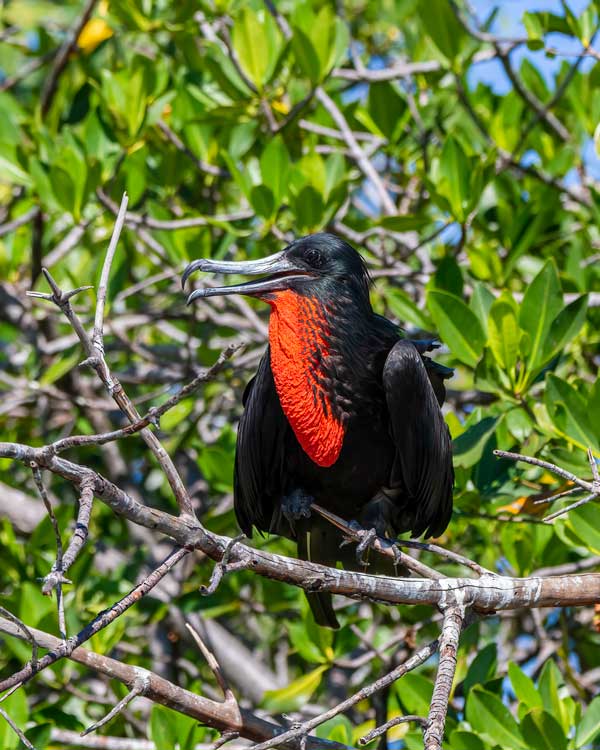
The Magnificent Frigatebird
Photo: Javier Gautier
Parque Nacional Cotubanamá
Cotubanamá is the perfect example of an untouched pre-columbine landscape - with a total mass of 791.9 square kilometers of compact subtropical forests, subterranean cave systems, and exotic Caribbean coral reefs. All home to an awesome array of bird fauna in the provinces of La Romana and La Altagracia.
The main attraction at Cotubanamá is Isla Saona (Saona Island), on the southern coast, where the most prevalent species are seen.
Birders can expect to see favorites like Sula Sulas (red-footed boobies), La Lechuza (the ashy-faced owl), and the Tijereta (the magnificent frigatebird) known for its drumbeat mating call.
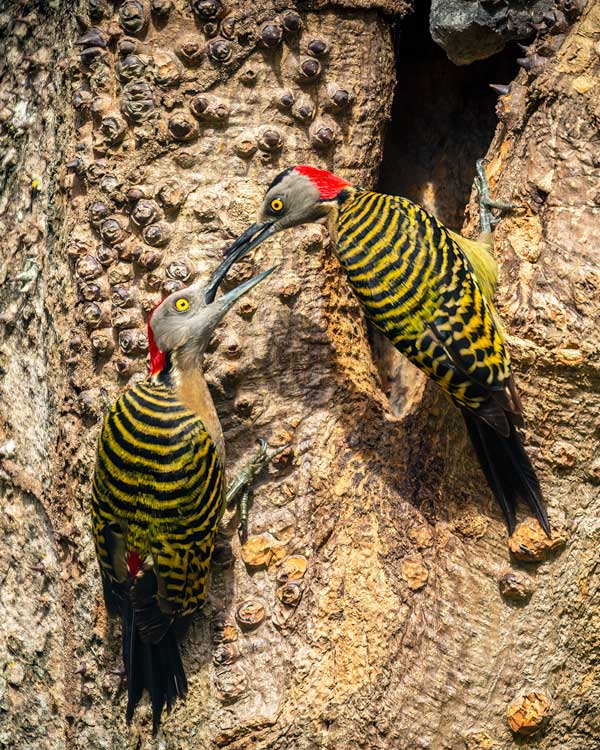
Hispaniolan Woodpeckers
Photo: Javier Gautier
Punta Cana
Punta Cana is more than just a beach resort town, it's an oasis for one of the highest concentrations of varied winged life in the country - due to its location on the east coast. Attracting both Caribbean and Atlantic Oceanic life, the animal scene is one of intense bird activity - typically Ardeidae species.
Within Punta Cana's coastal tropical terrain and open pastures, you'll find over 116 types of birds - including endemic, migratory, and native birds.
You'll be pleased to find the lovely Cuco Lagarto (Hispaniolan lizard cuckoo) - brilliant hummingbirds like the Colibri Verbena (vervain hummingbird) and the Zumbador Dorado (Antillean mango).
Also, satiny dark blue and orange Cigua Canarias (Hispaniolan orioles) and daring Carpinteros de la Hispaniola (Hispaniolan woodpecker) frequent the palms of Punta Cana, contributing to the tropical bird diversity.
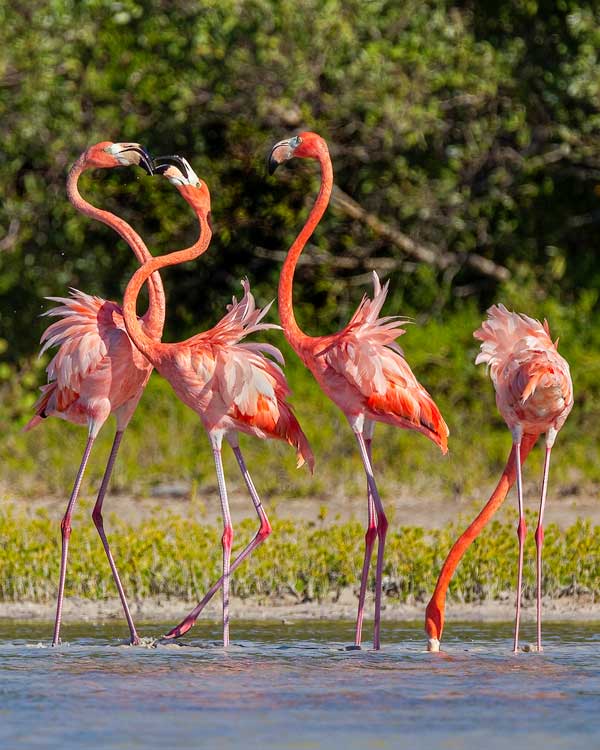
Flamingos at Laguna de Oviedo
Photo: Javier Gautier
Laguna Oviedo
The pearly green waters of Laguna Oviedo - the Caribbean's largest lagoon with an area of 25 square kilometers - is Jaragua National Park's largest body of water and prime territory for 60% of the total bird population - which has over 60 aquatic bird species to observe.
Frolicking and feeding in its hypersaline waters and the surrounding tropical mangroves, you'll find the likes of the prettiest pink Flamenco Caribeño (Phoenicopterus ruber) and droves of Cormorán Neotropical (Phalacrocorax brasilianus).
The prominent Pelicano Marrón (pelecanus occidentalis), and the black and white Charranes (Sternidae).
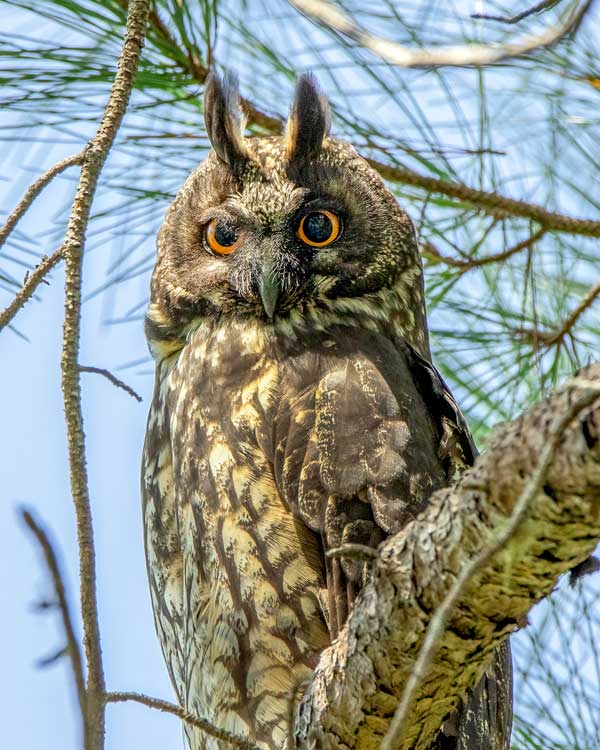
Stygian owl (Devil owl)
Photo: Javier Gautier
El Seibo
The province of El Seibo has recently caught the interest of ornithologists with a curiosity for exploring new Caribbean wildlife ecosystems in the Dominican Republic. With several national parks, natural reserves, and humid mountainous terrain of dense foliage that hides Salto La Jalda, the highest waterfall in the Caribbean.
At the Redonda and Limon Lagoon Natural Scientific Reserve, elegant ducks like Pato Pescuecilargos (northern pintails) and Zaramagullónes (pied-billed grebes) are species seen calmly floating on the still lagoon waters.
Skimming the surface are deep pink Cucharetas (roseate spoonbills), the Gallareta Pico Rojo (common gallinule), and Garzas Reales (grey herons).
And let’s not forget our friend - the often intimidating Stygian Owl (asio stygius) - overseeing this thriving environment.
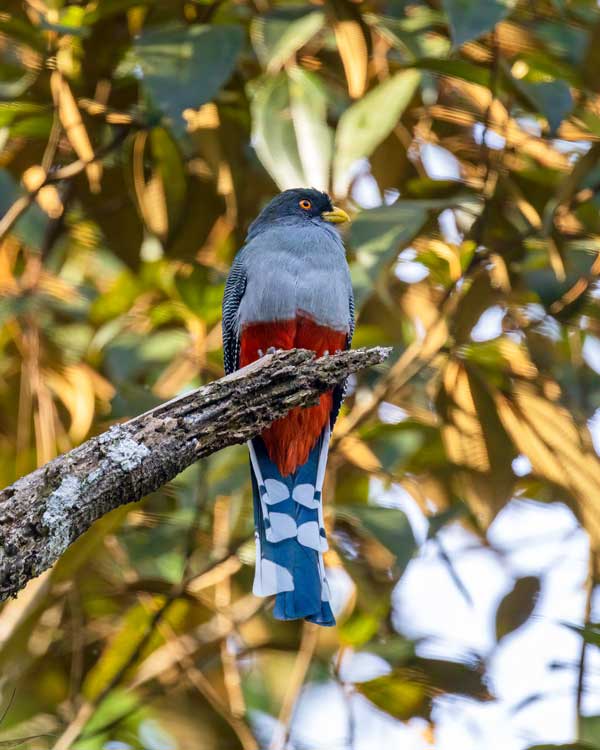
Hispaniolan Trogon
Photo: Fausto Suero
Ebano Verde Scientific Reserve
In the heartland Cibao region of the country in La Vega province, this highly protected 29 square kilometer scientific reserve has more than 100 feathered species living in the endemic Green Ebony (ebano verde) or Magnolia Pallescens forests that distinguishes this reserve from others.
Amid this very humid low-montane area in Jarabacoa, you'll hear the chirps and calls of tiny birds like the Barrancoli Chicuí (Todus subulatus) and Maroítas (Hispaniolan Pewees).
The echoing pecks of the Carpintero de la Sierra (Antillean piculet) and the swift Cuatro Ojos (Black-crowned Palm-tanager) are seen zooming through the brush - as the emblematic Trogón (Hispaniolan trogon) stays calmly perched on the higher forest branches.
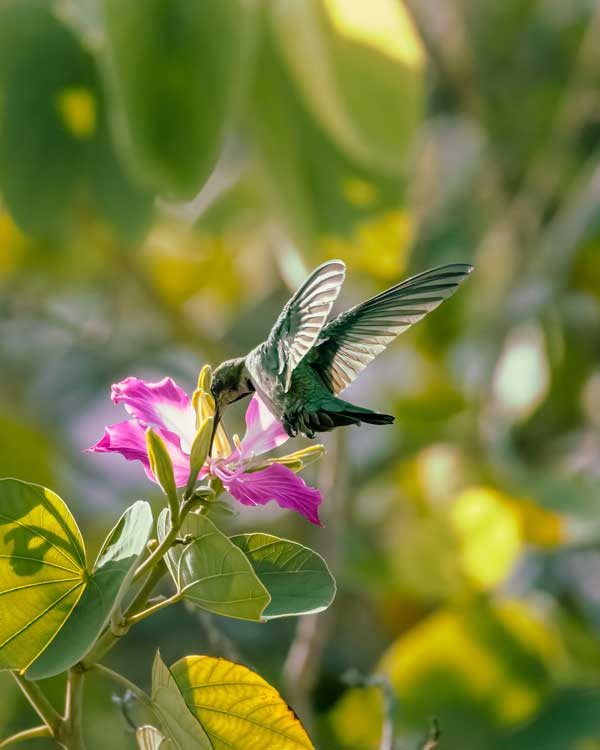
Zumbador Grande
Photo: Fausto Suero
Monte Cristi
Monte Cristi National Park is the largest very-dry subtropical region on the northwest coast of the Dominican Republic.
The park has a massive 550 square kilometers of uninterrupted natural beauty. It caters to a broad spectrum of birdlife living around its beaches, valleys, and skyscraping rock formations like the infamous El Morro.
During the mating season months from May through August, you'll observe one of the biggest aerial displays of bird fauna that includes Zumbadores (buzzers), Cotorras (parrots), and Canarios (canaries).
Migratory seabirds like Brown Noddies (charan pardo), Sooty Terns (Gaviota oscura), and Yellow Warblers (Setophaga petechia) also jump in on the fun.
Explore Dominican Wildlife & Nature
Hike to the Salto de Jimenoa Uno Waterfall
The Salto de Jimenoa Uno waterfall appears in the opening
Five Lesser-Known Destinations in Dominican Republic
Escape the crowds and explore lesser-known destinations such as Bonao
Explore Bahía de Las Águilas
Go glamping in Bahía de Las Águilas, a pristine paradise
Hike Pico Duarte – the highest mountain in the Caribbean
Everything you need to know about hiking to Pico Duarte
Get Lost in the Wilderness of Monte Cristi National Park
Get the basic information for your trip to Monte Cristi,
Constanza: The Unexpected Dominican Destination
Venture beyond the beaches and into the mountains in the
Explore Cueva de las Maravillas – the Cave of Wonders
Just outside La Romana, the Cueva de las Maravillas cave
8 Instagram Accounts that Will Make You Want to Visit the DR
Natural wonders, eco adventures and intimate personal diaries of daily
Cotubanamá National Park (Parque del Este)
One of the top day-trips from Punta Cana, the Cotubanamá
Ojos Indígenas Ecological Reserve
Just minutes from Punta Cana resorts, swim in incredible Larimar-colored
Categories
Tags
Share
Subscribe to our newsletter
Get more travel inspiration, tips and exclusive offers sent straight to your inbox

